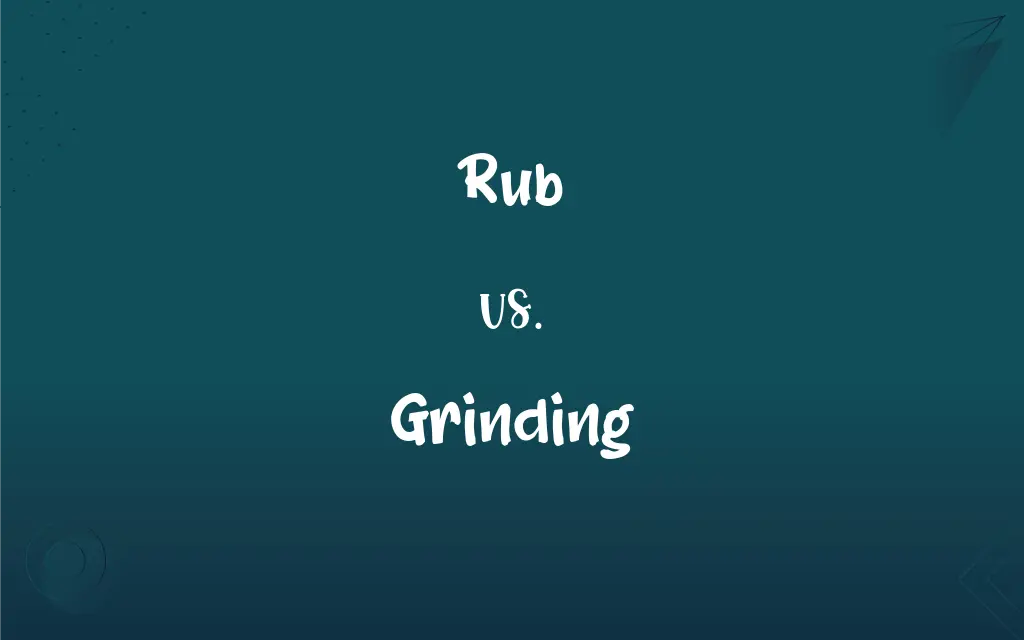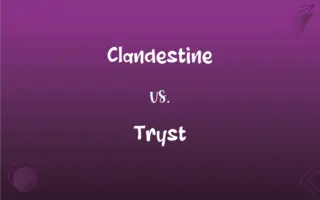Rub vs. Grinding: What's the Difference?
By Janet White & Harlon Moss || Updated on May 23, 2024
Rub involves applying friction to a surface, often gently and for a soothing effect, while grinding refers to wearing down or smoothing a surface through persistent, forceful abrasion.

Key Differences
Rub involves the act of moving something against a surface with some pressure, often with the hands or a cloth. It's typically a gentle action, meant to soothe or clean, such as rubbing a sore muscle or cleaning a table. Grinding, on the other hand, involves a more intense process where two surfaces are pressed together with significant force. This action is used to break down materials, such as grinding coffee beans or smoothing rough surfaces.
In various contexts, rubbing is often associated with care or maintenance. For example, one might rub oil into leather to maintain its quality. Grinding, however, is usually associated with breaking down or shaping materials. It’s a common process in manufacturing and food preparation, like grinding wheat into flour.
Rubbing can be seen in everyday cleaning activities, like rubbing a stain out of fabric. The action is controlled and gentle, ensuring the integrity of the fabric is maintained. Grinding, however, involves a more destructive process. For instance, grinding metal can produce sparks and significant heat, indicating the force involved.
When it comes to physical sensations, rubbing typically provides a soothing or warming effect, such as rubbing hands together to generate heat. Grinding, however, can be harsh and loud, often resulting in particles or dust from the material being ground down.
In terms of tools, rubbing might involve simple implements like cloths or sponges. Grinding, however, often requires specialized machinery or tools like grinders and mills, which are designed to handle the intense pressure and abrasion needed for the process.
ADVERTISEMENT
Comparison Chart
Definition
Gentle friction against a surface
Intense abrasion to wear down or smooth
Common Context
Cleaning, soothing
Manufacturing, food preparation
Physical Sensation
Soothing, gentle
Harsh, loud
Required Tools
Cloth, hands
Grinders, mills
Result
Cleaned or soothed surface
Broken down or smoothed material
ADVERTISEMENT
Rub and Grinding Definitions
Rub
To apply pressure while moving over a surface.
He rubbed the stain with a damp cloth.
Grinding
To reduce to small particles by crushing.
He grinds coffee beans every morning.
Rub
To apply pressure and friction to (a surface).
Grinding
To press together with force.
The chef was grinding spices for the dish.
Rub
To clean, polish, or manipulate by the application of pressure and friction.
Grinding
To reduce to small bits or crush to a fine powder
Grind wheat into flour.
Grind coffee beans.
Rub
To apply to a surface firmly and with friction
Rub lotion on the hands.
Rub dye into the fabric.
Grinding
To shape, sharpen, or refine with friction
Grind scissors to a fine edge.
Grind lenses for eyeglasses.
Rub
To move (an object or objects) firmly along a surface, especially repeatedly
Rub an eraser over the blackboard.
Rubbed my fingers over the sore spot.
Grinding
To rub (two surfaces) together harshly; gnash
Grind one's teeth.
Rub
To cause to become worn, chafed, or irritated.
Grinding
To bear down on harshly; crush
The team's spirit was ground down by harsh losses.
Rub
To remove, erase, or expunge
Rub away a stain.
Rubbed the sleep from my eyes.
Grinding
To oppress or weaken gradually or persistently
“Laws grind the poor, and rich men rule the law” (Oliver Goldsmith).
Rub
To exert pressure or friction on something.
Grinding
To operate by turning a crank
Ground a hurdy-gurdy.
Rub
To wear or chafe with friction
My shoes were beginning to rub.
Grinding
To instill or teach by persistent repetition
Ground the truth into their heads.
Rub
To cause irritation or annoyance.
Grinding
To perform the operation of grinding something.
Rub
To move along in contact with a surface; graze or scrape.
Grinding
To become crushed, pulverized, or powdered by friction
Those coffee beans ground easily.
Rub
To be transferred or removed by contact or proximity
Newsprint that rubbed off on my fingers.
Wished some of her luck would rub off on me.
Grinding
To move with noisy friction; grate
A train grinding along rusty rails.
Rub
The act of rubbing.
Grinding
Past tense and past participle grind·ed(grīndĭd) To ride a skateboard, a snowboard, or skis over a grind rail or narrow surface, often with the board or skis at right angles to the direction of movement.
Rub
The application of friction and pressure
A back rub.
Grinding
(Informal) To devote oneself to study or work
Grinding for a test.
Grinding away at housework.
Rub
A liniment or balm.
Grinding
Past tense and past participle grind·ed(grīndĭd) Slang To rotate the pelvis erotically, as while dancing or performing a striptease.
Rub
A seasoning made of ground spices and herbs, applied to the surface of meat, fish, or vegetables before cooking.
Grinding
The act of grinding.
Rub
An unevenness on a surface.
Grinding
A crunching or grinding noise.
Rub
An act or remark that annoys or hurts another.
Grinding
A specific grade or degree of pulverization, as of coffee beans
Drip grind.
Rub
A difficulty or obstacle
"The rub for extraterrestrial life on Europa is that the moon's surface is an icy wasteland" (William J. Broad).
Grinding
Bits of ground coffee; grounds.
Rub
An act of rubbing.
Give that lamp a good rub and see if any genies come out.
Grinding
(Informal) A laborious task, routine, or study
The daily grind.
Rub
A difficulty or problem.
Grinding
(Informal) A student who works or studies excessively.
Rub
(archaic) A quip or sarcastic remark.
Grinding
(Slang) An erotic rotation of the pelvis.
Rub
In the game of crown green bowls, any obstacle by which a bowl is diverted from its normal course.
Grinding
Present participle of grind
Rub
Any substance designed to be applied by rubbing.
A heat rub intended for muscular strains
Grinding
The action of grinding together or crushing into small particles.
Ominous creakings and grindings came from the innards of the machine.
Rub
A mixture of spices applied to meat before it is barbecued.
Grinding
(dance) A form of dance in which two people rub their bodies together.
Rub
A loan.
Grinding
Repeatedly performing the same quest or similar in-game activity in order to amass points or wealth.
Rub
(transitive) To move (one object) while maintaining contact with another object over some area, with pressure and friction.
I rubbed the cloth over the glass.
The cat rubbed itself against my leg.
I rubbed my hands together for warmth.
Grinding
Of or pertaining to the act or sound of grinding.
The meeting came to a grinding halt when the two sides could not agree.
Rub
(transitive) To rub something against (a second thing).
I rubbed the glass with the cloth.
Grinding
Relentlessly taxing; burdensome; exacting to the point of exhaustion.
A week of filled with grinding toil.
Rub
(intransitive) To be rubbed against something.
My shoes are beginning to rub.
Grinding
(obsolete) Crushing; oppressive; overwhelming.
Rub
(transitive) To spread a substance thinly over; to smear.
Meat rubbed with spices before barbecuing
Grinding
From Grind.
Rub
(dated) To move or pass with difficulty.
To rub through woods, as huntsmen
Grinding
Matter resulting from the process of grinding;
Vegetable grindings clogged the drain
Rub
To scour; to burnish; to polish; to brighten; to cleanse; often with up or over.
To rub up silver
Grinding
A harsh and strident sound (as of the grinding of gears)
Rub
To hinder; to cross; to thwart.
Grinding
The wearing down of rock particles by friction due to water or wind or ice
Rub
To touch the jack with the bowl.
Grinding
To wear down or smooth by friction.
The workers were grinding the rough edges off the metal.
Rub
To subject (a body) to the action of something moving over its surface with pressure and friction, especially to the action of something moving back and forth; as, to rub the flesh with the hand; to rub wood with sandpaper.
It shall be expedient, after that body is cleaned, to rub the body with a coarse linen cloth.
Grinding
To perform repetitive, strenuous work.
She spent hours grinding away at her studies.
Rub
To move over the surface of (a body) with pressure and friction; to graze; to chafe; as, the boat rubs the ground.
Grinding
To produce a grating sound by friction.
The gears started grinding loudly.
Rub
To cause (a body) to move with pressure and friction along a surface; as, to rub the hand over the body.
Two bones rubbed hard against one another.
Rub
To spread a substance thinly over; to smear.
The smoothed plank, . . .New rubbed with balm.
Rub
To scour; to burnish; to polish; to brighten; to cleanse; - often with up or over; as, to rub up silver.
The whole business of our redemption is to rub over the defaced copy of the creation.
Rub
To hinder; to cross; to thwart.
'T is the duke's pleasure,Whose disposition, all the world well knows,Will not be rubbed nor stopped.
Rub
To move along the surface of a body with pressure; to grate; as, a wheel rubs against the gatepost.
Rub
To fret; to chafe; as, to rub upon a sore.
Rub
To move or pass with difficulty; as, to rub through woods, as huntsmen; to rub through the world.
Rub
The act of rubbing; friction.
Rub
That which rubs; that which tends to hinder or obstruct motion or progress; hindrance; obstruction, an impediment; especially, a difficulty or obstruction hard to overcome; a pinch.
Every rub is smoothed on our way.
To sleep, perchance to dream; ay, there's the rub.
Upon this rub, the English ambassadors thought fit to demur.
One knows not, certainly, what other rubs might have been ordained for us by a wise Providence.
Rub
Inequality of surface, as of the ground in the game of bowls; unevenness.
Rub
Something grating to the feelings; sarcasm; joke; as, a hard rub.
Rub
Imperfection; failing; fault.
Rub
A chance.
Flight shall leave no Greek a rub.
Rub
A stone, commonly flat, used to sharpen cutting tools; a whetstone; - called also rubstone.
Rub
An unforeseen obstacle
Rub
The act of rubbing or wiping;
He gave the hood a quick rub
Rub
Move over something with pressure;
Rub my hands
Rub oil into her skin
Rub
Cause friction;
My sweater scratches
Rub
Scrape or rub as if to relieve itching;
Don't scratch your insect bites!
Rub
To move something back and forth against a surface.
She rubbed the lotion into her skin.
Rub
To cause friction by moving over a surface.
The cat rubbed against my leg.
Rub
To create warmth or comfort through friction.
Rub your hands together to stay warm.
Rub
To polish or clean by rubbing.
She rubbed the silverware until it shone.
FAQs
Can grinding be done without machinery?
While some grinding can be done manually, most grinding processes use machinery for efficiency.
What is grinding in a mechanical context?
Grinding in a mechanical context involves using abrasive forces to wear down or shape materials.
What does it mean to rub something?
Rubbing involves applying pressure and friction to a surface, often to clean or soothe it.
Is rubbing always gentle?
Yes, rubbing generally implies a gentler action compared to grinding.
What are common examples of rubbing in daily life?
Examples include rubbing lotion into skin, cleaning surfaces, and polishing items.
Does rubbing produce significant heat?
Rubbing can produce some heat but not as much as grinding.
What tools are commonly used for rubbing?
Common tools for rubbing include hands, cloths, sponges, and brushes.
What are common examples of grinding in daily life?
Examples include grinding coffee beans, spices, and smoothing rough surfaces.
Does grinding always involve a loud noise?
Grinding often produces noise, especially in industrial contexts.
Can grinding cause damage?
Yes, grinding can wear down materials significantly and even cause structural changes.
Can rubbing cause damage?
Rubbing is usually gentle, but excessive rubbing can cause wear.
Is grinding effective for breaking down materials?
Yes, grinding is specifically used to break down or smooth materials.
Are there specific tools for grinding in manufacturing?
Yes, grinders, mills, and abrasive wheels are designed for grinding.
Is rubbing effective for cleaning?
Yes, rubbing is effective for removing dirt and stains.
Are there specific tools for rubbing in cleaning?
Yes, tools like sponges, cloths, and brushes are designed for rubbing.
What sensation does rubbing typically evoke?
Rubbing typically evokes a soothing or warming sensation.
What sensation does grinding typically evoke?
Grinding evokes a harsh, abrasive sensation and sound.
Can grinding be part of a culinary process?
Yes, grinding is common in food preparation, like grinding spices or coffee.
Can rubbing be part of a therapeutic process?
Yes, rubbing is often used in massages and therapeutic treatments.
What’s the primary difference between rubbing and grinding?
The primary difference is the intensity; rubbing is gentle and soothing, while grinding is intense and abrasive.
About Author
Written by
Janet WhiteJanet White has been an esteemed writer and blogger for Difference Wiki. Holding a Master's degree in Science and Medical Journalism from the prestigious Boston University, she has consistently demonstrated her expertise and passion for her field. When she's not immersed in her work, Janet relishes her time exercising, delving into a good book, and cherishing moments with friends and family.
Co-written by
Harlon MossHarlon is a seasoned quality moderator and accomplished content writer for Difference Wiki. An alumnus of the prestigious University of California, he earned his degree in Computer Science. Leveraging his academic background, Harlon brings a meticulous and informed perspective to his work, ensuring content accuracy and excellence.
































































